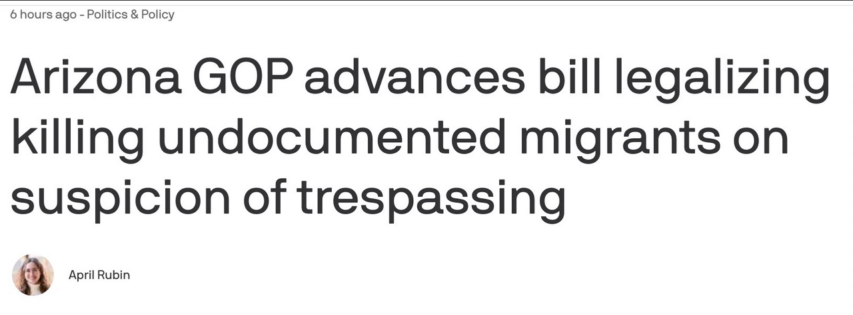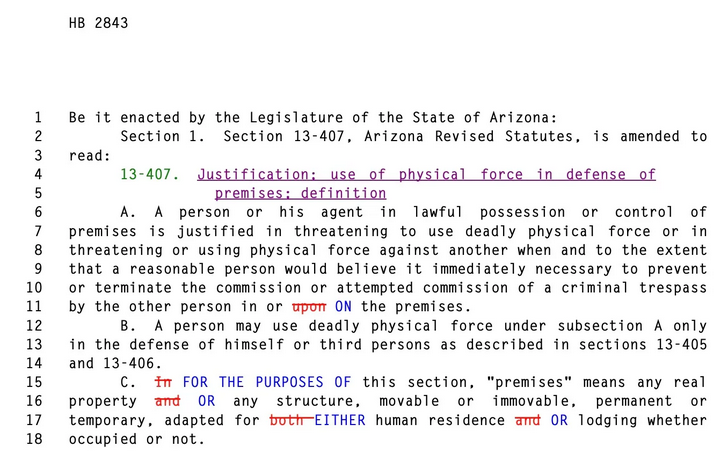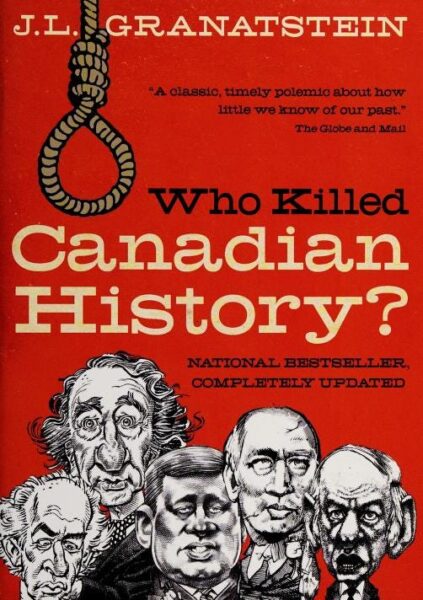TimeGhost History
Published 2 Apr 20251947 is a pivotal year: The British Empire crumbles as India and Pakistan gain independence amidst violence and mass migration. Truman launches a Cold War against Soviet communism, while spies infiltrate governments worldwide. Nations sign treaties reshaping Europe; Chuck Yeager breaks the sound barrier, and rumours swirl of aliens crashing at Roswell. Join us for the headlines that reshaped history!
(more…)
April 3, 2025
1947 Newscast: Spies, Aliens, and Collapsing Empires! – W2W 18
November 15, 2024
The Final Solution to the German Question
World War Two
Published 14 Nov 2024Millions of Germans continue to be expelled from their homes in Central and Eastern Europe. They run a gauntlet of violence, robbery, and even murder before arriving in the shattered remains of Berlin. By the end of 1945, the Allied Powers have at least agreed that further expulsions must be “orderly and humane”. But isn’t that a contradiction in terms?
(more…)
October 18, 2024
Operation Keelhaul: The Allies’ Final War Crime
World War Two
Published 17 Oct 2024After the war, millions of Soviet citizens are left over in Germany. Some of them are traitors, some are prisoners, some women and children. Stalin wants them back and the Western Allies are happy to help.
(more…)
September 19, 2024
German opinions are changing on the migration question
On of our key European commentators is back from a brief internet vacation and reports on recent changes in official German views on mass immigration:
There are other matters too, but before I can get to any of them, I must get this piece on the changing politics of mass migration in Germany off my chest. This is the most important issue facing Europe right now – more important than the folly of the energy transition, more crucial even than the fading memory of pandemic repression.
For nearly ten years, migration has felt like one of the most intractable problems in our entire political system. However crazy the policies, however contradictory and irrational, there was always only the towering mute wall of establishment indifference. It felt like the borders would be open forever, that we would have to sing vapid rainbow hymns to the virtues of diversity and inclusivity for the rest of our lives.
Suddenly, it no longer feels like that. Over the past weeks, a perfect storm of escalating migrant violence and electoral upsets in East Germany have changed the discourse utterly.
The cynical among you will say that none of this matters, that the migrants are still coming, that our borders are still open, and of course that’s true – as far as it goes. But it’s also true that there’s an order of operations here. A lot of things have to happen before we can turn return to a regime of normal border security, and I suspect they have to happen in a specific sequence: 1) Migrationist political parties have to feel electoral pressure and taste defeat at the ballot box first of all. 2) Then, as the establishment realises they are up against the limits of their ability to manipulate public opinion, the discourse around mass migration will have to shift, to deprive opposition parties of Alternative für Deutschland of their political advantage. Specifically, the lunatic oblivious press must begin to question the wisdom of allowing millions of unidentified foreigners to take up residence in our countries. This will then open the way for 3) the judiciary to revise their understanding of asylum policies and begin to interpret our laws in more rational, sustainable ways.
In Thüringen and Saxony, we have already had the electoral defeat of 1), and we will soon have more of it in Brandenburg. As a consequence of 1), we are now seeing some powerful glimmerings of 2). This is very important, because as the press expands the realm of acceptable discourse, a great many heretofore tabu thoughts and opinions are becoming irreversibly and indelibly conceivable.
Ten years ago, diversity was our strength, infinity refugees were our moral obligation and there were no limits to how many asylees we could absorb. Since August, not only Alternative für Deutschland but also that offshoot from the Left Party known as the Bündnis Sahra Wagenknecht, the centre-right Christian Democrats, a substantial centrist faction of the Social Democrats, and many others beyond whatever “the extreme right” is supposed to be, agree that migration is in fact an enormous problem. They also agree that our moral obligations to the world’s poor and disadvantaged are finite, and that there are indeed clear limits to the number of asylees Germany can support. What is more, they are saying all of these things in the open.
August 17, 2024
“The notion of a pre-existing Palestinian state is a modern fabrication that ignores the region’s actual history”
Debunking some of the common talking points about the Arab-Israeli conflicts down to the present day:
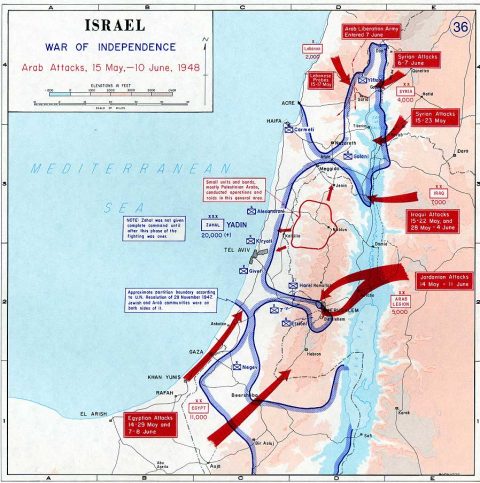
Arab attacks in May and June 1948.
United States Military Academy Atlas, Link.
Before Israel declared independence in 1948, the region now known as Israel, the West Bank and the Gaza Strip was part of the British Mandate for Palestine, which was established by the League of Nations after the fall of the Ottoman Empire in the First World War.
Under Ottoman rule, the area was divided into various administrative districts, with no distinct political entity known as “Palestine”. The concept of a Palestinian national identity emerged in the 20th century, largely in response to the Zionist movement and increased Jewish immigration in the area.
However, there was never a Palestinian state, flag or anthem. The notion of a pre-existing Palestinian state is a modern fabrication that ignores the region’s actual history.
The modern State of Israel’s legitimacy is rooted in international law and global recognition. On Nov. 29, 1947, the United Nations General Assembly passed Resolution 181, known as the “Partition Plan”, proposing two states — one Jewish and one Arab.
The Jewish community accepted the plan, demonstrating a willingness to compromise for peace. However, the Arab states rejected it, refusing to recognize any Jewish state, and instead launched a military assault on Israel following its declaration of independence on May 14, 1948.
Another pervasive myth is the “Nakba” or “catastrophe”, narrative, which claims that Palestinians were forcibly expelled by Israel in 1948. This version omits the critical context that it was the Arab nations that invaded Israel, causing many Arabs to be expelled or flee their homes.
Rather than absorbing the displaced population, the surrounding Arab countries kept them in refugee camps, using them as pawns to pressure Israel. Organizations like UNRWA perpetuated this situation, keeping Palestinians in limbo rather than encouraging their integration into their host countries. This contrasts sharply with how other refugee populations have been handled, where integration and resettlement are the norm.
The land referred to as “Palestine” has always been inherently Jewish. The Jewish people have maintained a continuous presence there for thousands of years, long before Islam or the Arab conquests.
August 8, 2024
The Korean War Week 007 – The Pusan Perimeter – August 6, 1950
The Korean War by Indy Neidell
Published Aug 6, 2024The UN forces are withdrawn this week across the Naktong River into a new defensive zone in the Southeast corner of the Peninsula — the Pusan Perimeter, but already as the week begins they are in great danger from the right hook near the coast by the North Korean 6th Division, that threatens to upend everything, taking Chinju and aiming for Masan. There are also machinations afoot with the Chinese in Taiwan, and the fear that a larger war could erupt if things aren’t handled right concerning the Chinese; it’s a week full of tension.
(more…)
May 18, 2024
The plight of Greek refugees after the Greco-Turkish War
As part of a larger look at population transfers in the Middle East, Ed West briefly explains the tragic situation after the Turkish defeat of the Greek invasion into the former Ottoman homeland in Anatolia:

“Greek dialects of Asia Minor prior to the 1923 population exchange between Greece and Turkey. Evolution of Greek dialects from the late Byzantine Empire through to the early 20th century leading to Demotic in yellow, Pontic in orange, and Cappadocian in green. Green dots indicate Cappadocian Greek speaking villages in 1910.”
Map created by Ivanchay via Wikimedia Commons.
While I understand why people are upset by the Nakba, and by the conditions of Palestinians since 1948, or particular Israeli acts of violence, I find it harder to understand why people frame it as one of colonial settlement. The counter is not so much that Palestine was 2,000 years ago the historic Jewish homeland – which is, to put it mildly, a weak argument – but that the exodus of Arabs from the Holy Land was matched by a similar number of Jews from neighbouring Arab countries. This completely ignored aspect of the story complicates things in a way in which some westerners, well-trained in particular schools of thought, find almost incomprehensible.
The 20th century was a period of mass exodus, most of it non-voluntary. Across the former Austro-Hungarian, Russian and Ottoman empires the growth in national consciousness and the demands for self-determination resulted in enormous and traumatic population transfers, which in Europe reached its climax at the end of the Second World War.
Although the bulk of this was directed at Germans, the aggressors in the conflict, they were not the only victims – huge numbers of Poles were forcibly moved out of the east of the country to be resettled in what had previously been Germany. The entire Polish community in Lwów, as they called it, was moved to Wrocław, formerly Breslau.
Maps of central and eastern Europe in the 19th century would have shown a confusing array of villages speaking a variety of languages and following different religions, many of whom wouldn’t have been aware of themselves as Poles, Romanians, Serbs or whatever. These communities had uneasily co-existed under imperial rulers until the spread of newspapers and telegraph poles began to form a new national consciousness, usually driven by urban intellectuals LARPing in peasant fantasies.
This lack of national consciousness was especially true of the people who came to be known as Turks; the Balkans in the late 19th century had a huge Muslim population, most of whom were subsequently driven out by nationalists of various kinds. Many not only did not see themselves as Turks but didn’t even speak Turkish; their ancestors had simply been Greeks or Bulgarians who had adopted the religion of the ruling power, as many people do. Crete had been one-third Muslim before they were pushed out by Greek nationalists and came to settle in the Ottoman Empire, which is why there is still today a Greek-speaking Muslim town in Syria.
This population transfer went both ways, and when that long-simmering hatred reached its climax after the First World War, the Greeks came off much worse. Half a million “Turks” moved east, but one million Greek speakers were forced to settle in Greece, causing a huge humanitarian crisis at the time, with many dying of disease or hunger.
That population transfer was skewed simply because Atatürk’s army won the Greco-Turkish War, and Britain was too tired to help its traditional allies and have another crack at Johnny Turk, who – as it turned out at Gallipoli – were pretty good at fighting.
The Greeks who settled in their new country were quite distinctive to those already living there. The Pontic Greeks of eastern Anatolia, who had inhabited the region since the early first millennium BC, had a distinct culture and dialect, as did the Cappadocian Greeks. Anthropologically, one might even have seen them as distinctive ethnic groups altogether, yet they had no choice but to resettle in their new homeland and lose their identity and traditions. The largest number settled in Macedonia, where they formed a slight majority of that region, with many also moving to Athens.
The loss of their ancient homelands was a bitter blow to the Greek psyche, perhaps none more so than the permanent loss of the Queen of Cities itself, Constantinople. This great metropolis, despite four and a half centuries of Ottoman rule, still had a Greek majority until the start of the 20th century but would become ethnically cleansed in the decades following, the last exodus occurring in the 1950s with the Istanbul pogroms. Once a mightily cosmopolitan city, Istanbul today is one of the least diverse major centres in Europe, part of a pattern of growing homogeneity that has been repeated across the Middle East.
But the Greek experience is not unique. Imperial Constantinople was also home to a large Jewish community, many of whom had arrived in the Ottoman Empire following persecution in Spain and other western countries. Many spoke Ladino, or Judeo-Spanish, a Latinate language native to Iberia. Like the Greeks and Armenians, the Jews prospered under the Ottomans and became what Amy Chua called a “market-dominant minority”, the groups who often flourish within empires but who become most vulnerable with the rise of nationalism.
And with the growing Turkish national consciousness and the creation of a Turkish republic from 1923, things got worse for them. Turkish nationalists and their allies murdered vast numbers of Armenians, Greeks and Assyrian Christians in the 1910s, and the atmosphere for Jews became increasingly tense too, with more frequent outbursts of communal violence. After the First World War, many began emigrating to Palestine, now under British control and similarly spiralling towards violence caused by demographic instability.
February 29, 2024
Arizona GOP pushes to legalize hunting down suspected illegal immigrants with deadly force! Film at 11!
Chris Bray reports on this utterly abhorrent piece of proposed legislation that will literally condemn any brown person in the state of Arizona to be murdered out of hand by evil red-hatted Trump supporters … or will it?
Republicans in the Arizona legislature have advanced a bill that would allow anyone in the state to just casually gun down any migrant anytime they feel like that filthy brown person might be trespassing. You can trust that this is really happening, because it’s in the news.
Delightfully, Axios reporter April Rubin trained at the New York Times. Here’s how she starts this story:
Arizona Republicans are advancing a bill that would allow people to legally kill someone accused of attempting to trespass or actively trespassing on their property.
The big picture: The legislation, which is expected to be vetoed if it reaches the state’s Democratic governor, would legalize the murder of undocumented immigrants, who often have to cross ranches that sit on the state’s border with Mexico.
These monsters, they’re legalizing the murder of undocumented migrants.
So, as always, let’s read the actual bill:
A person in lawful possession of property can threaten deadly force, or potentially use deadly force, in response to an act of criminal trespassing: You can go out on your property with a gun and tell a trespasser to get lost.
But Subsection B is the key to the actual use of deadly force, and journalists aren’t saying anything about it (emphasis added): “A person may use deadly physical force under subsection A only in the defense of himself or third persons as described in sections 13-405 and 13-406,” existing sections of Arizona state law. The bill explicitly references an existing legal standard for the use of deadly force.
February 25, 2024
Who Killed Canadian History?
I was not aware that it has been a full twenty-five years since J.L. Granatstein published his polemical Who Killed Canadian History?:
In that work, Granatstein asserts that the rationale for the history taught in Canadian schools was political, not historical. And sexism and racism were being taught, not history.
In the postmodern era, the priority of vast areas of history teaching and historiography, and Granatstein is far from the only academic who noticed this, transitioned from evidence and facts, to morals and emotions. Western oppression became the source of historiographical obsession. And the practice, which has shaped Western historiography since at least the turn of the twentieth century, of injecting moral judgements adjacent to facts and timelines, became entrenched.
This has happened because important areas of historiography, and historical pedagogy, have been subsumed into social sciences. My 9 and 11 year old children do not have a history class. What they learn about history, which isn’t much, is in a class called “social studies”. My son, who is in grade 6, and who was never previously taught anything about the Holocaust, is learning about Nazis Germany’s persecution of the Jews in the most obscure way. His introduction to the Holocaust included a lesson pertaining to the MS St. Louis, a passenger ship carrying 907 Jewish refugees fleeing Nazi persecution that was refused entry into Canada in 1939.
The ship’s Jewish passengers were safely returned to four European countries, but tragically 254 were later killed in the Holocaust. A terrible outcome. Indeed, one of the rare dark stains on Canada’s otherwise quite exemplary record of offering sanctuary to refugees. But if Canadians at the time had known that refusing entry to the MS St. Louis would result in the cold-blooded murder of 254 innocent people, would they have allowed entry? A question not raised in my son’s class.
As well, what Canadians knew or didn’t know about the genocidal ambitions of the Nazis did not come up in my son’s classroom discussions. Indeed, that would be too complex and nuanced for 12 year old’s. They also did not discuss conditions in Canada at the time that may have played a role in the consequential decision to turn away the MS St. Louis. Nor did they mention the Evian Conference, which occurred the year prior to the MS St. Louis‘ ill-fated arrival to Canada.
The Evian Conference of 1938 was held in the French resort town of Évian-les-Bains. There were 32 participating nations, including Canada, who were “to seek, by international agreement, avenues for an orderly resettlement of (Jewish) refugees from Germany and Austria”. Shockingly, at the close of the talks, none of the nations involved had offered to accept any Jewish refugees.
From the London Spectator (1938):
If the Conference has not been a complete failure, it has achieved little to boast about, all the States sympathizing and none desiring to admit refugees. Even the United States, as prime mover, offers no more than the quota.
My son did not come away from his class with an impression that Canada was not alone in its reluctance to accept refugees. This, and other such lessons, seem as if they are designed to implant a sense of revulsion over Canada’s past failures, instead of patriotism over its achievements and victories. What a disservice to young Canadian learners.
This cherry-picked event from history, which doesn’t really deal with the Holocaust, but assumes kids will appreciate related events that occurred over the backdrop of the Holocaust, is doubly misleading in that it presents Canada as a racist country hostile to refugees, before establishing that the opposite was (and is) overwhelmingly true throughout the arc of Canadian history up to the present.
It’s not even clear if my son took away from the lesson that Hitler was the far bigger villain, compared to his “racist colonial” country of Canada.
Clearly, Canada eventually let in Jewish people, and people from all ethnicities. We became the world’s first multiculturalism, and our large cities are among the most cosmopolitan and multicultural places in the world. This needs to be established first for young learners of Canada’s story. Clearly established, before one starts teaching the exceptions to the rule. But my son is getting some weird blend of oddities presented as introductory material to larger subjects which hold historical conclusions opposite to the ones the cherry-picked exceptions portray. It only makes sense that these exceptional events are selected deliberately for political, not educational, reasons.
Twenty-five years ago, Granatstein wrote of Canadian schools,
The material taught stressed the existence of anti-Aboriginal, anti-Metis, and anti-Asian racism, as well as male sexism and discrimination against women, as if these issues were and always had been the primary identifying characteristics of Canada … The history taught is that of the grievers among us, the present-day crusaders against public policy or discrimination. The history omitted is that of the Canadian nation and people.
Who Killed Canadian History? also criticized the teacher-curated practice whereby early exposure to Canadian history is random and discontinuous concerning time periods and individuals, and “without much regard for chronology”. Exactly what I have been experiencing with my kids, decades after Granatstein identified the problem.
October 19, 2023
Why there are no regional refuges available to Gazan civilians
Ed West outlines the sad story of Palestinian civilians uprooted from their homes by the many conflicts that have convulsed the region:

Arab attacks in May and June 1948.
United States Military Academy Atlas, Link.
It is generally a good idea for refugees to be housed in neighbouring countries rather than on different continents, for a number of reasons, but we should be wary of casually stating that Arab states should house Gazans. In a difficult region many of these countries have already put themselves under enormous strain through acts of immense generosity, and none more so than Jordan.
[…]
The survival of Jordan’s monarchy has been one of the more surprising outcomes of the past few decades, and experts have repeatedly bet against it. The country has an unusually bad hand in many ways. Situated beside the disputed Holy Land, it lacks the natural resources of neighbouring Saudi Arabia and Iraq, while also being more remote than Lebanon or Syria, which had long been at the heart of Mediterranean trading networks and far more plugged into European markets.
But most of all it has suffered the destabilising effect of refugees. Abdullah is named after his great-grandfather, the first King of Jordan, whose assassination in 1951 forms the opening of Hussein’s autobiography; indeed he calls it “the most profound influence of my life”. He was just 15 years-old when he travelled with his grandfather to Jerusalem to perform Friday prayers, where the monarch was shot dead by a Palestinian. The gunman then fired at Hussein but the bullet struck a medal his grandfather had given him.
Abdullah I had ruled the new kingdom for just five years, and it endured an incredibly bad start with defeat in the 1948 Arab-Israeli war, which led to a surge of refugees. Estimates of exact numbers seem to vary hugely, but in Lion of Jordan, Avi Shlaim writes that 700,000 Palestinians left in 1948, and of these “450,000 ended up in Jordan, which did more than any other Arab state to help them resettle and integrate with the rest of society”.
He wrote: “The refugees in Jordan wanted to preserve their separate Palestinian identity, but this ran counter to Abdullah’s policy of ‘Jordanization’.” He gave them citizenship rights “but the refugees were a great burden on the weak Jordanian economy; it simply did not have the financial resources to cope with a humanitarian tragedy on such a vast scale.” Many ended up in resentful poverty and “the Palestinians thus became an important factor in domestic Jordanian politics”.
Another source suggests that in 1949, “Jordan welcomed approximately 900,000 refugees by amending the country’s 1928 Law of Nationality to grant equal citizenship to Palestinians; the 1954 Law of Jordanian Nationality later extended citizenship to Palestinians who arrived in Jordan after the 1949 addendum.”
After another defeat against Israel in 1967, up to 300,000 displaced Palestinians in the West Bank retained Jordanian citizenship, and today around 40% of the Jordanian population descend from Palestinian refugees, although the figure may be higher (again, they vary hugely). What seems certain is that about 40% of displaced Palestinians and their descendants live in Jordan, with another 10% in Syria (although many of those have since fled to Lebanon).
The Hashemites, unlike some Arab countries, were keen to integrate the newcomers and to avoid them having to endure a permanent refugee existence; that is why three-quarters of Palestinians in Jordan are Jordanian citizens, although Palestinians from Gaza aren’t, that area having been part of Egypt before the Six-Day War.
In contrast Palestinians who fled to Syria were not given citizenship, for all the talk of solidarity, and often remained in refugee camp-cities for decades (many of which were heavily affected by the Syrian war).
In Lebanon it was even worse; there the Palestinians could neither gain citizenship, nor in many cases access things like healthcare, education or work. The situation here was uniquely dangerous, because their arrival tipped the country’s incredibly delicate balance between Christians, Shia, Sunni and Druze; in 1975 the country descended into civil war, a horror that saw a modern example of shibboleths where Christian militiamen would present tomatoes to suspected Palestinians and ask them to pronounce the name.
This refugee surge had a destabilising effect on Jordan. Already in 1958 things were so bad that Hussein hoped to form a tripartite union with Saudi Arabia and Iraq to counter the influence of Gamal Abdel Nasser’s Egypt. Neither neighbour was too keen on the idea, and Saudi prince Abd al-Ilah remarked that “Hussein’s trouble stemmed from the fact that 70 per cent of his subjects were Palestinians with no loyalty to the throne”.
But in 1970, three years after the Six-Day War, it reached a crisis point, with the British ambassador commenting that “the mixture became so volatile that the container exploded”. There now came full civil war in Jordan between the army and the Palestinian fedayeen.
Jordan had become home to the Palestinian Liberation Organisation, but this umbrella group was itself split into different factions, Fatah being the largest and most moderate. They were reluctant to get involved in the internal affairs of other Arab states, but this was not the case with the more extreme Popular Front for the Liberation of Palestine led by Dr George Habash (who, as his name suggests, was a Christian) and the Marxist-Leninist Popular Democratic Front for the Liberation of Palestine (yes, it does get very Life of Brian).
September 30, 2023
Multiculturalism has led to a “promissory note that the West cannot fulfill”
Colby Cosh on a recent speech by British Home Secretary Suella Braverman decrying the inevitable result of western multicultural attitudes and actions:

The Rt Hon Suella Braverman KC MP, Secretary of State for the Home Department.
Picture by Rory Arnold / No 10 Downing Street via Wikimedia Commons.
U.K. Home Secretary Suella Braverman’s scathing criticism of the postwar framework for refugee protection needs to be considered, but is falling on deaf ears
The concept of multiculturalism, whether you like it or not, is of acknowledged Canadian origin. So perhaps we should all flinch a little when it is grumblingly condemned by European leaders — an increasingly common phenomenon that may have reached a new pinnacle on Tuesday.
Suella Braverman, the United Kingdom’s Conservative home secretary, appeared at the Washington, D.C., headquarters of the American Enterprise Institute to deliver a resounding critique of the postwar framework for refugee protection and of the “misguided” and “toxic” multiculturalism doctrine that has bent it out of shape.
Braverman’s speech is meeting with an orgy of denunciation among British liberals and celebrities. On the other hand, the inevitable fate of the speech is to be laughed off by anti-immigration critics who have heard British and European politicians warn for decades that humanitarianism cannot be a suicide pact for Old World nation-states — without ever doing anything much themselves to change migration policy.
In Braverman’s account, European countries devised the United Nations Refugee Convention largely to sort out the continent’s own affairs in the aftermath of the Second World War. Refugees are defined in the text as those with a “well-founded fear of being persecuted,” but the treaty is now interpreted so as to permit ill-disguised economic migration, to encourage unlawful and risky crossings of seas and borders, and to facilitate prolonged shopping by migrants among desirable destination countries.
The result, for better or worse, is that refugee protections are now potentially available to nigh on a billion people, creating a “promissory note that the West cannot fulfill.” (Or, as French President Emmanuel Macron put it a few days ago, “We (Europeans) cannot accommodate all the misery in the world.”) Braverman enumerates four critiques of a period in which “there has been more migration to the U.K. and Europe … than in all the time that went before.”
January 27, 2023
Canada’s worsening refugee problem
Paul Wells discusses some of the frustrations being aired on the French-language Radio-Canada news channel about the increasing, possibly record-breaking flow of asylum seekers entering Canada at the Roxham Road pedestrian border crossing from Champlain, New York:
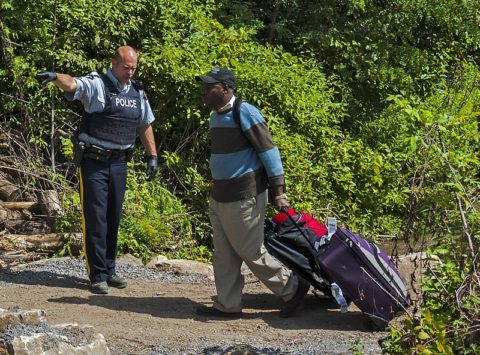
An asylum seeker, crossing the US-Canadian border illegally from the end of Roxham Road in Champlain, NY, is directed to the nearby processing center by a Mountie on 14 August, 2017.
Photo by Daniel Case via Wikimedia Commons.
The issue at hand is Roxham Road, a pedestrian border crossing between small-town Quebec and upstate New York, 45 minutes’ drive from Montreal City Hall. Thousands of people walk into Canada there every month and demand asylum. Caring for them and processing their claims takes money and work. Along comes [former Parti Québécois leader Jean-François] Lisée with a suggestion.
If Justin Trudeau can’t get changes to the bilateral Safe Third Country Agreement to slow this human traffic — and colleagues report that he can’t — then, Lisée says, Quebec should make the newcomers the rest of Canada’s problem.
Within 24 hours after somebody walks across Roxham Road, Lisée says, “We’ll sort them, we’ll keep all the francophones and those who have immediate family in Quebec. And the others, we’ll put them in a nice air-conditioned bus and we’ll take them to Immigration Canada in Ottawa.”
I should emphasize a few things here, to salvage any hope of a civil discussion.
(1) What Lisée is suggesting won’t happen. In particular, it won’t happen because the party he used to lead has three seats out of 125 in Quebec’s National Assembly.
(2) The very suggestion made the other panelists uncomfortable. They took turns criticizing Lisée.
(3) The panel show’s host, Sébastien Bovet, immediately drew the obvious parallel: This is what governors in the U.S. south do. “Ron DeSantis charters flights and buses to send migrants north”, Bovet said, and indeed it is true. We shall see whether there are legal repercussions for DeSantis’ lurid stunt.
(4) Finally, I don’t think asylum seekers should be sorted by language ability and sent packing if they fail either. What’s going on at Roxham Road is a policy crisis, but it’s also a human drama. Lisée spoke during the same week as the funeral for a Haitian man who died trying to cross back into the US after his claims in Canada got hung up in procedural limbo.
Having said all of that, perhaps we can notice the scale of what’s happening at Roxham Road, and ponder how it fits into a generalized sense of Canadian bewilderment.
If you’re wondering why so many in Quebec are freaking out about a single pedestrian border crossing, it may be because the numbers are a bit breathtaking. This chart shows that 39,171 asylum claimants were intercepted by the RCMP between regular ports of entry in Quebec in 2022, compared to 369 in the entire rest of the country combined. So if asylum claims are a problem — and whatever else they are, they’re at least an administrative challenge — then 99.1% of the challenge is in Quebec.
That figure of 39,171, or 107 people a day, is more than twice as many as in any previous year in the last decade and, I’d guess without having statistics dating back further, the most in any province in any year in Canada’s history. (Much of this statistical background was covered in a column by the Toronto Sun‘s Brian Lilley earlier this week.)
June 19, 2022
QotD: “Aristos à la Lanterne!“
When the rage of downtrodden French peasants, living-on-the-edge city dwellers and frustrated bourgeois towards the ruling nobles and royalty final exploded into a kind of civic wildfire, there was no appeasing their collective anger. A handful of wary and fleet-footed aristocrats, or those who had made a good living out of serving the royals and the nobility fled from France in all directions. The slow and unwary made a humiliating appointment with Madame Guillotine before a contemptuous and jeering crowd, if they had not already run afoul of a mob with pikes and knives, and ropes at the foot of civic lampposts. (The fury of the French Revolution flamed so furiously that it that eventually it burned a good few leading revolutionaries themselves. As the Royalist pamphleteer Jacques Mallet Du Pan remarked pithily, “Like Saturn, the Revolution devours its children.”) For a long time, my sympathies as regards parties in the French Revolution tended to be with those who fell out with it, sympathies formed by popular literature and music: The Scarlett Pimpernel, A Tale of Two Cities, Dialogues of the Carmelites, and other tales which basically tut-tutted the madness which overcame all reason and discretion, and championed those who had the brunt of it fall on them, either justly or not. How fortunate that our own very dear revolution had been able to escape such conflagrations: Loyalists in the colonies might have suffered being tarred and feathered and ridden out of town or having to leave in an undignified rush when Yankee Doodle went to town and made their independence stick. But the jailhouse regrets of those who called up and inflamed that conflagration, even inadvertently is not my concern here.
Sgt. Mom, “Aristos a la Lanterne!”, Chicago Boyz, 2022-03-17.
May 18, 2022
For the Canadian government, announcing new programs is far more important than implementing them
It often appears that the Liberal government in Ottawa operates almost exclusively on an “appearance only” basis: whatever the situation, it’s the “optics” that matter the most and actual delivery on announcements barely counts at all. It doesn’t help at all that the media generally has the same set of priorities, because they need things to talk about on news shows and the headlines don’t write themselves in the newspapers — and legacy media’s social media concerns are even more about flash and clickbait than their primary product.
Canada has been quick to announce new initiatives to help Ukrainian refugees, but true to form, very slow to actually make any of these initiatives happen, as Joti Heir discusses in The Line:
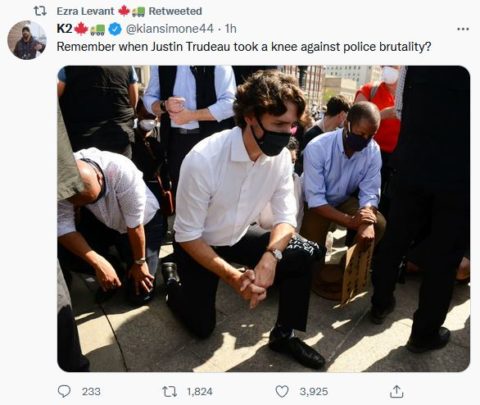
Justin Trudeau has always had a strong affinity for the symbolic gesture, especially when the media are around to record it.
It’s almost as though the Canadian federal government is working buttocks-backward when it comes to the Ukrainian refugee file. After Russia invaded Ukraine on February 24, helping Ukrainian refugees get to a safe place fast was the biggest concern. However, now, close to three months later, the bigger concern is how to help the refugees that are in Canada or making their way here.
“We are seeing an increasing amount of frustration within our community about the pace with which programs and announcements are being implemented,” says Orest Zakydalsky, senior policy analyst with the Ukrainian Canadian Congress (UCC).
“For example, a month ago, the prime minister announced income support when he co-hosted the [StandWithUkraine] telethon with the European Council president, he announced there would be income support for people coming to Canada. A month later, they’re not available.”
The announcement on April 9 indicated that Ukrainian refugees would be able to access $500 per week for a period of up to six weeks. At the same time, it was also announced that housing support in the form of two-week hotel stays would be provided. Both programs do not appear to have been implemented.
“We appreciate this is a very difficult situation for governments, this is a crisis that emerged very suddenly,” says Zakydalsky.
“On the other side, the other problem is that the people that are in Europe, that have left Ukraine, that are looking to come to Canada, see these announcements and quite reasonably think that when a program is announced it is available.”
February 15, 2022
Total War on Valentine’s Day – WW2 – Reading Comments
World War Two
Published 14 Feb 2022Another installment of Across the Airwaves, where we highlight some of the best viewer comments under our videos. It’s Valentine’s Day and we’re feeling pretty romantic, so Indy and Spartacus will be reading comments that are all about love, humanity, and relationships.
(more…)


